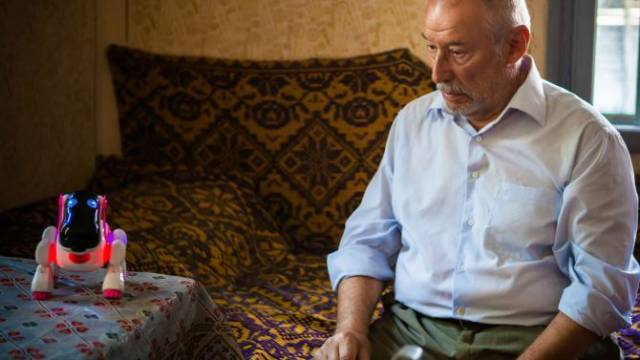
 The Japanese Dog is an account of loss and healing, fragility and strength. Beneath the film's apparent sentimentality, metaphysical and religious themes are always close at hand, lending it a rare glow of sincerity. The particular brand of lightness with which it approaches the tragic is unique and confident. With a phenomenal performance from veteran actor Victor Rebenguic, this debut feature-length film should earn director Tudor Christian Jurgiu recognition in international film circuits.
The Japanese Dog is an account of loss and healing, fragility and strength. Beneath the film's apparent sentimentality, metaphysical and religious themes are always close at hand, lending it a rare glow of sincerity. The particular brand of lightness with which it approaches the tragic is unique and confident. With a phenomenal performance from veteran actor Victor Rebenguic, this debut feature-length film should earn director Tudor Christian Jurgiu recognition in international film circuits.
Mr. Costache (Victor Rebenguic), a stolid old villager, loses his home and his wife to a flood that ravages his small rural community. We find him relying on the local government for food and shelter. He soon learns that his son, Ticu (Serban Pavlu), will be returning from Tokyo to attend his mother’s memorial service. Ticu arrives, bringing with him his Japanese wife, Hiroko (Kana Hashimoto), and son, Koji (Toma Hashimoto).
The significance of this homecoming accumulates depth as we learn about the family’s history. Without himself ever understanding why, Ticu ran away from home after agreeing to marry a local village girl, Gabi (Iona Abur). Eventually, after settling in Japan, he reached out to his parents back in Romania. Only his mother returned his letters and calls. Mr. Costache, without himself ever understanding why, never did. This irrational non-communication and its corresponding sense of guilt makes this central relationship between father and son painful yet realistic.
The film's minimal, naturalistic style complements the narrative in an artful way. Jurgiu’s shots are long and mute. Often we are left alone with Costache for minutes at a time as he silently goes about patching up his new house or walking along a muddy path. Beautiful shots of the Romanian countryside remind us of the catastrophe with which the film began, and also show us the prominent role nature plays in the lives of rural village people. The slow pacing of the film almost mimics the speed of natural regeneration. Symbolically, at least, it seems as if Jurgiu means for us to see the process of reconciliation between father and son as in some sense natural. Jurgiu would welcome any religious connections we make here. The Japanese Dog is rich with conceptual content and aesthetic clarity. Jurgiu reminds us that subtlety can be audacious, and Rebenguic upholds his reputation as one of the masters in Romanian cinema.